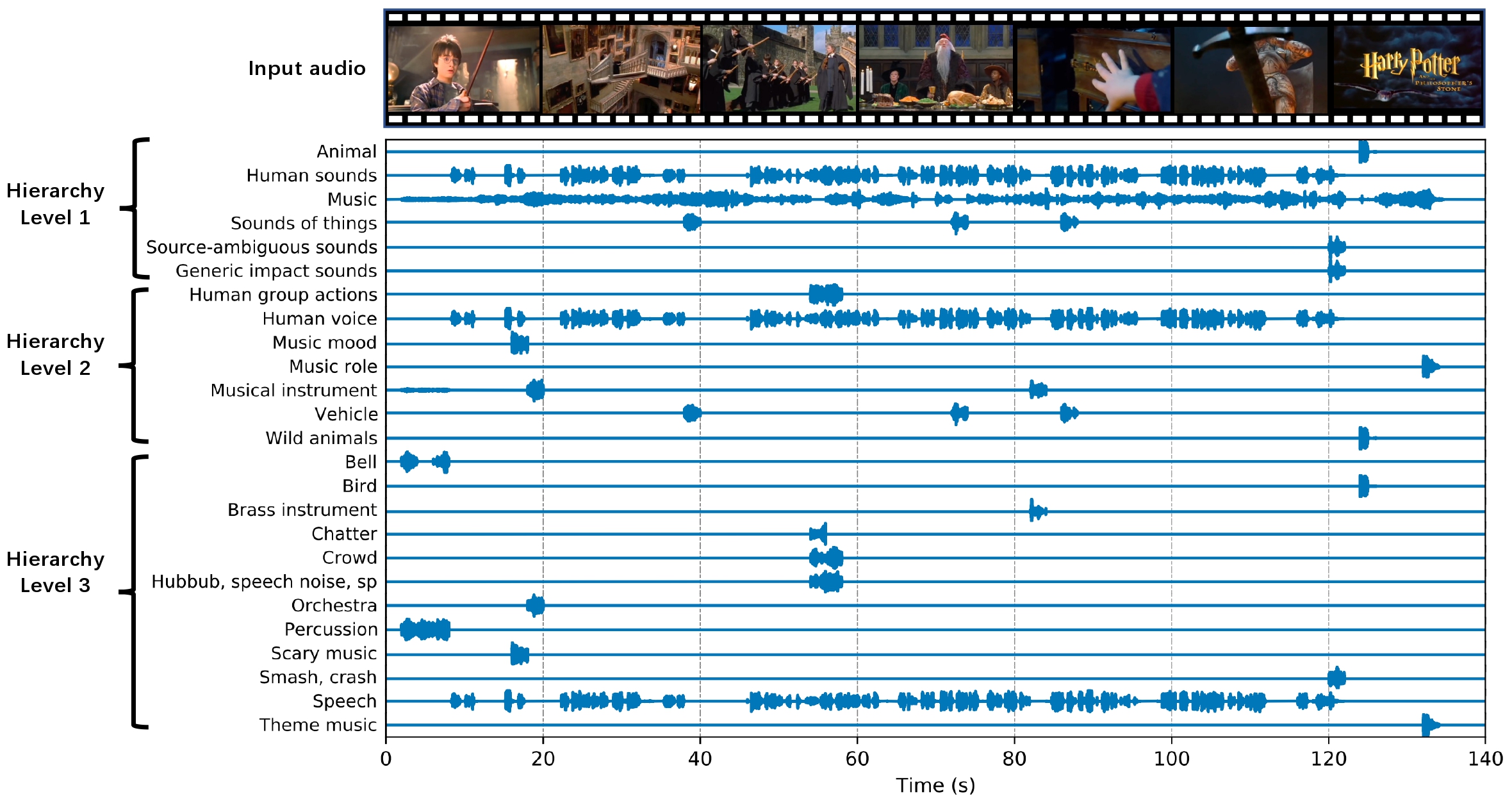This is the PyTorch implementation of the Universal Source Separation with Weakly labelled Data [1]. The USS system can automatically detect and separate sound classes from a real recording. The USS system can separate up to hundreds of sound classes sound classes in a hierarchical ontology structure. The USS system is trained on the weakly labelled AudioSet dataset only. Here is a demo:
 Fig. The hierarchical separation result of the trailer of Harry Potter and the Sorcerer's Stone. Copyright: https://www.youtube.com/watch?v=VyHV0BRtdxo
Fig. The hierarchical separation result of the trailer of Harry Potter and the Sorcerer's Stone. Copyright: https://www.youtube.com/watch?v=VyHV0BRtdxo
Prepare environment (optional)
conda create -n uss python=3.8
conda activate ussInstall the package
pip install usswget -O "harry_potter.flac" "https://huggingface.co/RSNuts/Universal_Source_Separation/resolve/main/uss_material/harry_potter.flac"uss -i "harry_potter.flac"uss -i "harry_potter.flac" --levels 1 2 3uss -i "harry_potter.flac" --class_ids 0 1 2 3 4Download query audios (optional)
wget -O "queries.zip" "https://huggingface.co/RSNuts/Universal_Source_Separation/resolve/main/uss_material/queries.zip"
unzip queries.zipDo separation
uss -i "harry_potter.flac" --queries_dir "queries/speech"Users could also git clone this repo and run the inference in the repo. This will let users to have more flexibility to modify the inference code.
conda create -n uss python=3.8
conda activate uss
pip install -r requirements.txtDownload our pretrained checkpoint:
wget -O "pretrained.ckpt" "https://huggingface.co/RSNuts/Universal_Source_Separation/resolve/main/uss_material/ss_model%3Dresunet30%2Cquerynet%3Dat_soft%2Cdata%3Dfull%2Cdevices%3D8%2Cstep%3D1000000.ckpt"Then perform the inference:
CUDA_VISIBLE_DEVICES=0 python3 uss/inference.py \
--audio_path=./resources/harry_potter.flac \
--levels 1 2 3 \
--config_yaml="./scripts/train/ss_model=resunet30,querynet=at_soft,data=full.yaml" \
--checkpoint_path="pretrained.ckpt"Download the AudioSet dataset from the internet. The total size of AudioSet is around 1.1 TB. For reproducibility, our downloaded dataset can be accessed at: link: https://pan.baidu.com/s/13WnzI1XDSvqXZQTS-Kqujg, password: 0vc2. Users may only download the balanced set (10.36 Gb, 1% of the full set) to train a baseline system.
The downloaded data looks like:
dataset_root
├── audios
│ ├── balanced_train_segments
│ | └── ... (~20550 wavs, the number can be different from time to time)
│ ├── eval_segments
│ | └── ... (~18887 wavs)
│ └── unbalanced_train_segments
│ ├── unbalanced_train_segments_part00
│ | └── ... (~46940 wavs)
│ ...
│ └── unbalanced_train_segments_part40
│ └── ... (~39137 wavs)
└── metadata
├── balanced_train_segments.csv
├── class_labels_indices.csv
├── eval_segments.csv
├── qa_true_counts.csv
└── unbalanced_train_segments.csv
Notice there can be missing files on YouTube, so the numebr of files downloaded by users can be different from time to time. Our downloaded version contains 20550 / 22160 of the balaned training subset, 1913637 / 2041789 of the unbalanced training subset, and 18887 / 20371 of the evaluation subset.
Audio files in a subdirectory will be packed into an hdf5 file. There will be 1 balanced train + 41 unbalanced train + 1 evaluation hdf5 files in total.
./scripts/1_pack_waveforms_to_hdf5s.shThe packed hdf5 files looks like:
workspaces/uss
└── hdf5s
└── waveforms (1.1 TB)
├── balanced_train.h5
├── eval.h5
└── unbalanced_train
├── unbalanced_train_part00.h5
...
└── unbalanced_train_part40.h5
Pack indexes into hdf5 files for balanced training.
./scripts/2_create_indexes.shThe packed indexes files look like:
workspaces/uss
└── hdf5s
└── indexes (3.0 GB)
├── balanced_train.h5
├── eval.h5
└── unbalanced_train
├── unbalanced_train_part00.h5
...
└── unbalanced_train_part40.h5
Create 100 2-second mixture and source pairs to evaluate the separation result of each sound class. There are in total 52,700 2-second pairs for 527 sound classes.
./scripts/3_create_evaluation_data.shThe evaluation data look like:
workspaces/uss
└── evaluation
└── audioset
├── 2s_segments_balanced_train.csv
├── 2s_segments_test.csv
├── 2s_segments_balanced_train
│ ├── class_id=0
│ │ └── ... (100 mixture + 100 clean)
│ │...
│ └── class_id=526
│ └── ... (100 mixture + 100 clean)
└── 2s_segments_test
├── class_id=0
│ └── ... (100 mixture + 100 clean)
│...
└── class_id=526
└── ... (100 mixture + 100 clean)
Train the universal source separation system.
./scripts/4_train.shOr simply execute:
WORKSPACE="workspaces/uss"
CUDA_VISIBLE_DEVICES=0 python3 uss/train.py \
--workspace=$WORKSPACE \
--config_yaml="./scripts/train/ss_model=resunet30,querynet=at_soft,data=balanced.yaml"To appear